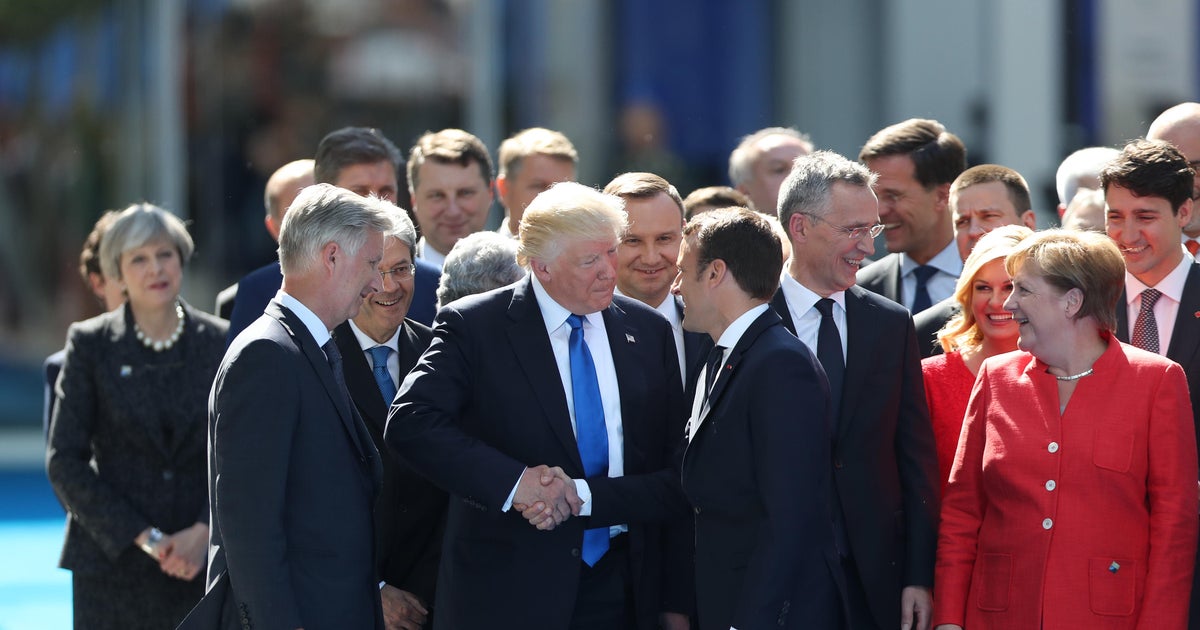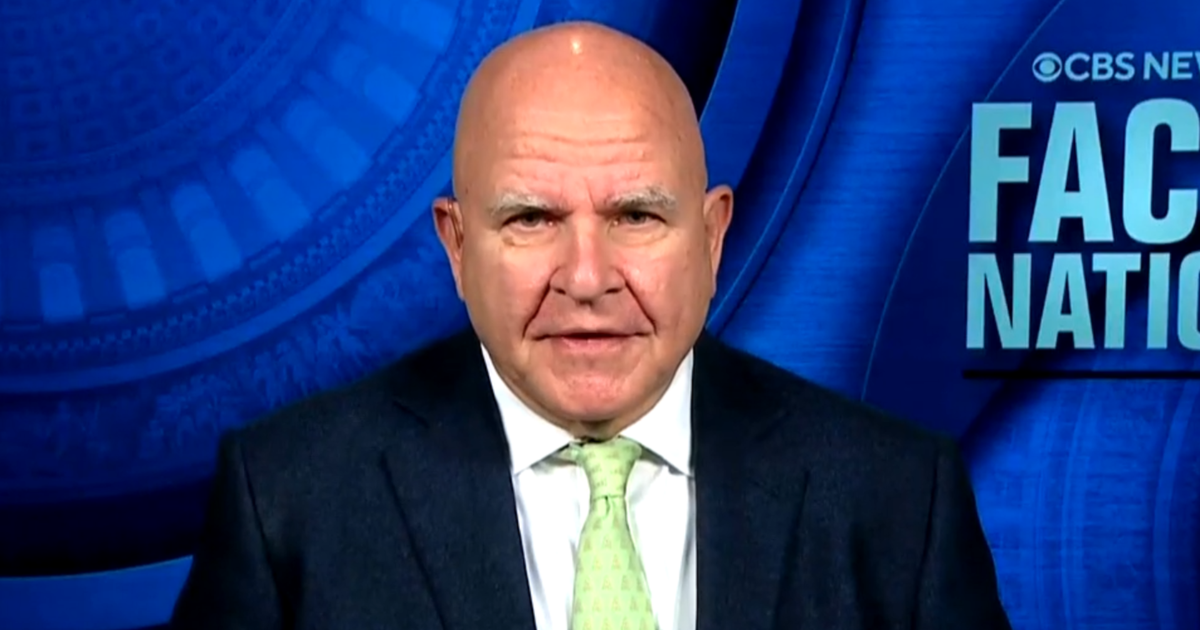CBS News
NATO allies brace for possible Trump 2024 victory

London — With six months to go until the presidential election, America’s NATO allies are planning to boost their defense spending ahead of the potential disruption of a second Donald Trump presidency.
NATO Secretary General Jens Stoltenberg is preparing a funding plan to try to insulate the 75-year-old military partnership from any changing political realities that might affect the alliance, according to Oana Lungescu, who until last year was the longtime lead NATO spokesperson for Stoltenberg.
“It is important to have predictability both for allies and for Ukraine,” Lungescu told CBS News. “This [plan] relieves the U.S. of some of its organizational burden while still maintaining full oversight,” she said.
Stoltenberg has proposed a $107 billion, five-year package of military aid for Ukraine that would give the broader alliance a more direct role in funding, Reuters reported last month.
Jasper Juinen/Bloomberg via Getty Images
Under the plan, European allies would create a shared Ukraine aid fund and increase their contributions to Kyiv’s war effort, reducing the sizable funding provided by the U.S.
Trump’s first term as president demonstrated that the 2024 presumptive Republican nominee is unafraid to upend the NATO alliance. Trump shocked America’s allies with his open criticism of the failure of some NATO members to meet defense funding commitments, and the Trump campaign has said that calling on allies to increase their defense spending is a policy that a future Trump White House would aggressively pursue.
In an emailed statement, Trump campaign national press secretary Karoline Leavitt said that “President Trump got our allies to increase their NATO spending by demanding they pay up, but Crooked Joe Biden went back to letting them take advantage of the American taxpayer.”
“When President Trump returns to the Oval Office, he will restore peace and rebuild American strength and deterrence on the world stage,” Leavitt said.
Lungescu said that the strategy proposed by Stoltenberg would address Trump’s complaint that NATO allies aren’t doing enough to share the economic burden. At the same time, Stoltenberg is trying to protect Ukraine from the kind of severe delays in Congress — mostly driven by House Republicans — that halted U.S. aid and weapons funding for the first half of the year. NATO allies are also increasing their own individual defense spending, Lungescu told CBS News, although she also pointed out that American presidents dating back to Eisenhower have criticized NATO partners for not contributing enough.
NATO guidelines say member states should commit a minimum of 2% of their Gross Domestic Product (GDP) to defense spending to continue to ensure the Alliance’s military readiness.
By NATO’s own admission, in terms of GDP, the wealth of its members “nearly equals that of the U.S.” But “non-U.S. Allies together spend less than half of what the United States spends on defense,” according to NATO’s website.
As of 2023, only 10 of the 30 other NATO allies had met the 2% spending commitment, excluding the U.S., though two-thirds of the NATO allies are expected to meet the target by the end of the year.
“I think by the time we get to the Washington NATO summit in July, we will have updated figures and will be in an even better position in terms of significantly increased defense spending,” Lungescu predicted.
Trump vows to not protect NATO allies who don’t raise their spending
In February, former President Trump said at a campaign rally in South Carolina that he’d encourage Russia to “do whatever the hell they want” to NATO allies who don’t pay their fair share into the Western military alliance.
Referring to a conversation with an unnamed leader of an NATO country who asked him, “If we don’t pay, are you still going to protect us,” Trump said he replied, “Absolutely not.”
Since Trump left office in Jan. 2021, his former national security adviser, John Bolton, has said the former president had been close to withdrawing the U.S.from NATO at the end of a 2018 summit and said another Trump term presents an existential threat to the trans-Atlantic alliance.
“Many [NATO] countries owe us a tremendous amount of money… The United States has paid and stepped up like nobody,” Trump said at a July 2018 NATO gathering, adding that “something has to be done.”
Will Trump withdraw U.S. from NATO?
“I think Trump will cause significant damage in a second term, damage that in some cases will be irreparable,” Bolton wrote in his 2020 memoir, “The Room Where It Happened.” He said he believes Trump intends to pull America out of the alliance if reelected.
“I think he fully intends to do that,” Bolton wrote. “I think that would be a catastrophic decision for America and a whole host of other things. It’s a very grim prospect to see Trump in for a second term.”
“I think that actually the biggest danger he [Trump] is for NATO is his unpredictability,” Ben Hodges, a former commanding general of the U.S. Army in Europe, told CBS News. “The urgency of defense investment is even greater if Trump turns out to be not as dependable as every other American president has been.”
Hodges said that a way to ensure that NATO allies maintain smooth diplomatic relations with any incoming Trump administration would be for America’s allies to honor their commitments and increase their defense spending now.
But he’s skeptical that Mr. Trump would move to withdraw the U.S. from NATO, pointing to a law passed in Congress last year that prohibits the president from withdrawing from NATO or using any appropriated funds for that purpose without approval from lawmakers.
War game simulates NATO collapse in a second Trump term
A recent war game run by Finley Grimble, a former intelligence analyst for the U.K. Ministry of Defense, found that in the event of a second Trump presidency, the alliance would be vulnerable to collapse, even if the U.S. doesn’t withdraw from NATO.
Grimble’s war game ran a scenario in which Trump wins the election. The new administration immediately attempts to unilaterally broker a peace deal between Ukraine and Russia. The talks break down and Trump then slashes foreign aid to Ukraine.
In the absence of having the congressional majority needed to formally withdraw the U.S. from the NATO treaty, the Trump White House then significantly reduces U.S. participation in NATO exercises, including moving 50% of America’s military presence in Europe, to the Indo-Pacific region.
Grimble told CBS News that his analysis showed such a scenario would leave NATO a “hollowed out, unprepared shell” by pursuing a policy of NATO “dormancy.”
In Grimble’s war game, Trump takes advantage of NATO’s command structure in which the supreme allied commander of NATO forces in Europe is always a U.S. officer and is responsible for the overall command of NATO military operations.
“NATO has these war-fighting plans that are ready to roll out… but the supreme allied commander in Europe would answer to Donald Trump,” Grimble told CBS News.
“You tell [the NATO supreme allied commander] to stop cooperating, to stop enacting the plans, and the whole thing falls apart. And that’s what Trump did in the game,” he said.
CBS News
Former Israeli hostages released in truce 1 year ago call for action to release those still held

Former Israeli hostages who were freed from Hamas captivity during a week-long humanitarian pause in fighting exactly one year ago Sunday called for immediate action to secure a deal for the release of those still held.
The only truce in the ongoing Israel-Hamas war on Nov. 24, 2023 – fewer than two months after fighting began – led to the release of 80 Israelis held by militants in Gaza. They were freed in exchange for 240 Palestinians detained in Israeli jails.
Repeated efforts since then by mediators from Qatar, Egypt and the United States to secure another truce and hostage release have failed. Qatar early this month said it was suspending its mediation role until the warring sides show “seriousness.”
Mostafa Alkharouf/Anadolu via Getty Images
Gabriella Leimberg was kidnapped during the Oct. 7, 2023, Hamas attack and was released along with her daughter, Mia, and sister Clara.
“For 53 days, the one thing that kept me going is that we, the people of Israel, the Jewish people, sanctify life — we don’t leave anyone behind,” she said.
Leimberg added: “Everything has already been said and now action is required. We don’t have any more time.”
Around 100 hostages are still in Gaza, and at least a third are believed to be dead.
“I survived and I was fortunate to get my entire family back,” Leimberg said. “I want and demand this for all the families of the hostages.”
Hamas wants Israel to end the war and withdraw all troops from Gaza. Israel has offered only to pause its offensive.
The Palestinian death toll from the war surpassed 44,000 this week, according to Gaza’s Health Ministry, which does not distinguish between civilians and combatants in its count.
Maya Alleruzzo / AP
Danielle Aloni, who was kidnapped with her five-year-old daughter, Emelia, and freed after 49 days, spoke at the ceremony of the “increasing danger” those still being held face every day.
She said those still in captivity “suffer physical, sexual, and psychological abuse, their identity and dignity crushed anew each day”.
“It took the Israeli government about two months to secure a deal for me and 80 other Israeli hostages. Why is it taking over a year to reach another deal to free them from this hell?” asked Aloni, whose brother-in-law, David Cunio, and his brother, Ariel Cunio, are still being held.
She emphasized that, even though she and the other hostages gained their freedom a year ago, “we haven’t really left the tunnels,” — referring to Hamas’ underground tunnels where many of the hostages were held.
“The feeling of suffocation, the terrible humidity, the stench — these sensations still envelop us,” Aloni said.
“If people could truly understand what it means to be held in subhuman conditions in tunnels, surrounded by terrorists for 54 days — there’s no way they would allow hostages to remain there for 415 days!” said Raz Ben Ami, who was released in the deal a year ago.
Her husband, Ohad, is still among those being held.
Ben Ami called for a ceasefire to “bring back all the hostages as quickly as possible”.
CBS News
Couple charged for allegedly stealing $1 million from Lululemon in convoluted retail theft scheme

A couple from Connecticut faces charges for allegedly taking part in an intricate retail theft operation targeting the apparel company Lululemon that may have amounted to $1 million worth of stolen items, according to a criminal complaint.
The couple, Jadion Anthony Richards, 44, and Akwele Nickeisha Lawes-Richards, 45, were arrested Nov. 14 in Woodbury, Minnesota, a suburb of Minneapolis-St. Paul. Richards and Lawes-Richards have been charged with one count each of organized retail theft, which is a felony, the Ramsey County Attorney’s Office said. They are from Danbury, Connecticut.
The alleged operation impacted Lululemon stores in multiple states, including Minnesota.
“Because of the outstanding work of the Roseville Police investigators — including their new Retail Crime Unit — as well as other law enforcement agencies, these individuals accused of this massive retail theft operation have been caught,” a spokesperson for the attorney’s office said in a statement on Nov. 18. “We will do everything in our power to hold these defendants accountable and continue to work with our law enforcement partners and retail merchants to put a stop to retail theft in our community.”
Both Richards and Lawes-Richards have posted bond as of Sunday and agreed to the terms of a court-ordered conditional release, according to the county attorney. For Richards, the court had set bail at $100,000 with conditional release, including weekly check-ins, or $600,000 with unconditional release. For Lawes-Richards, bail was set at $30,000 with conditional release and weekly check-ins or $200,000 with unconditional release. They are scheduled to appear again in court Dec. 16.
Prosecutors had asked for $1 million bond to be placed on each half of the couple, the attorney’s office said.
Richards and Lawes-Richards are accused by authorities of orchestrating a convoluted retail theft scheme that dates back to at least September. Their joint arrests came one day after the couple allegedly set off store alarms while trying to leave a Lululemon in Roseville, Minnesota, and an organized retail crime investigator, identified in charging documents by the initials R.P., recognized them.
The couple were allowed to leave the Roseville store. But the investigator later told an officer who responded to the incident that Richards and Lawes-Richards were seasoned shoplifters, who apparently stole close to $5,000 worth of Lululemon items just that day and were potentially “responsible for hundreds of thousands of dollars in loss to the store across the country,” according to the complaint. That number was eventually estimated by an investigator for the brand to be even higher, with the criminal complaint placing it at as much as $1 million.
Richards and Lawes-Richards allegedly involved other individuals in their shoplifting pursuits, but none were identified by name in the complaint. Authorities said they were able to successfully pull off the thefts by distracting store employees and later committing fraudulent returns with the stolen items at different Lululemon stores.
“Between October 29, 2024 and October 30, 2024, RP documented eight theft incidents in Colorado involving Richards and Lawes-Richards and an unidentified woman,” authorities wrote in the complaint, describing an example of how the operation would allegedly unfold.
“The group worked together using specific organized retail crime tactics such as blocking and distraction of associates to commit large thefts,” the complaint said. “They selected coats and jackets and held them up as if they were looking at them in a manner that blocked the view of staff and other guests while they selected and concealed items. They removed security sensors using a tool of some sort at multiple stores.”
CBS News contacted Lululemon for comment but did not receive an immediate reply.
CBS News
Former Trump national security adviser says next couple months are “really critical” for Ukraine

Washington — Lt. Gen. H.R. McMaster, a former national security adviser to Donald Trump, said Sunday that the upcoming months will be “really critical” in determining the “next phase” of the war in Ukraine as the president-elect is expected to work to force a negotiated settlement when he enters office.
McMaster, a CBS News contributor, said on “Face the Nation with Margaret Brennan” that Russia and Ukraine are both incentivized to make “as many gains on the battlefield as they can before the new Trump administration comes in” as the two countries seek leverage in negotiations.
With an eye toward strengthening Ukraine’s standing before President-elect Donald Trump returns to office in the new year, the Biden administration agreed in recent days to provide anti-personnel land mines for use, while lifting restrictions on Ukraine’s use of U.S.-made longer range missiles to strike within Russian territory. The moves come as Ukraine marked more than 1,000 days since Russia’s invasion in February 2022.
Meanwhile, many of Trump’s key selection for top posts in his administration — Rep. Mike Waltz for national security adviser and Sens. Marco Rubio for secretary of state and JD Vance for Vice President — haven’t been supportive of providing continued assistance to Ukraine, or have advocated for a negotiated end to the war.
CBS News
McMaster said the dynamic is “a real problem” and delivers a “psychological blow to the Ukrainians.”
“Ukrainians are struggling to generate the manpower that they need and to sustain their defensive efforts, and it’s important that they get the weapons they need and the training that they need, but also they have to have the confidence that they can prevail,” he said. “And any sort of messages that we might reduce our aid are quite damaging to them from a moral perspective.”
McMaster said he’s hopeful that Trump’s picks, and the president-elect himself, will “begin to see the quite obvious connections between the war in Ukraine and this axis of aggressors that are doing everything they can to tear down the existing international order.” He cited the North Korean soldiers fighting on European soil in the first major war in Europe since World War II, the efforts China is taking to “sustain Russia’s war-making machine,” and the drones and missiles Iran has provided as part of the broader picture.
“So I think what’s happened is so many people have taken such a myopic view of Ukraine, and they’ve misunderstood Putin’s intentions and how consequential the war is to our interests across the world,” McMaster said.
On Trump’s selections for top national security and defense posts, McMaster stressed the importance of the Senate’s advice and consent role in making sure “the best people are in those positions.”
McMaster outlined that based on his experience, Trump listens to advice and learns from those around him. And he argued that the nominees for director of national intelligence and defense secretary should be asked key questions like how they will “reconcile peace through strength,” and what they think “motivates, drives and constrains” Russian President Vladimir Putin.
Trump has tapped former Rep. Tulsi Gabbard to be director of national intelligence, who has been criticized for her views on Russia and other U.S. adversaries. McMaster said Sunday that Gabbard has a “fundamental misunderstanding” about what motivates Putin.
More broadly, McMaster said he “can’t understand” the Republicans who “tend to parrot Vladimir Putin’s talking points,” saying “they’ve got to disabuse themselves of this strange affection for Vladimir Putin.”
Meanwhile, when asked about Trump’s recent selection of Sebastian Gorka as senior director for counterterrorism and deputy assistant to the president, McMaster said he doesn’t think Gorka is a good person to advise the president-elect on national security. But he noted that “the president, others who are working with him, will probably determine that pretty quickly.”














